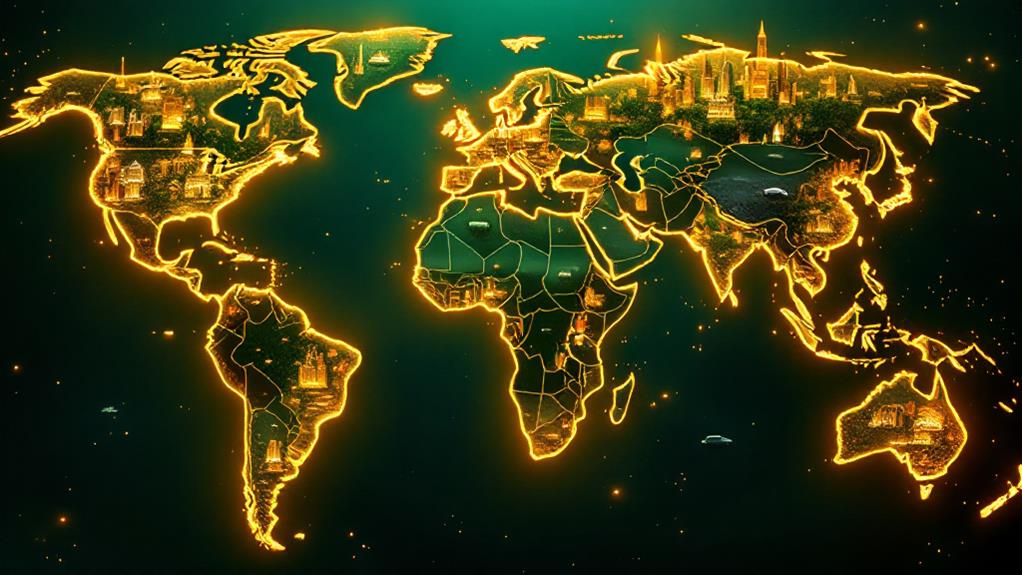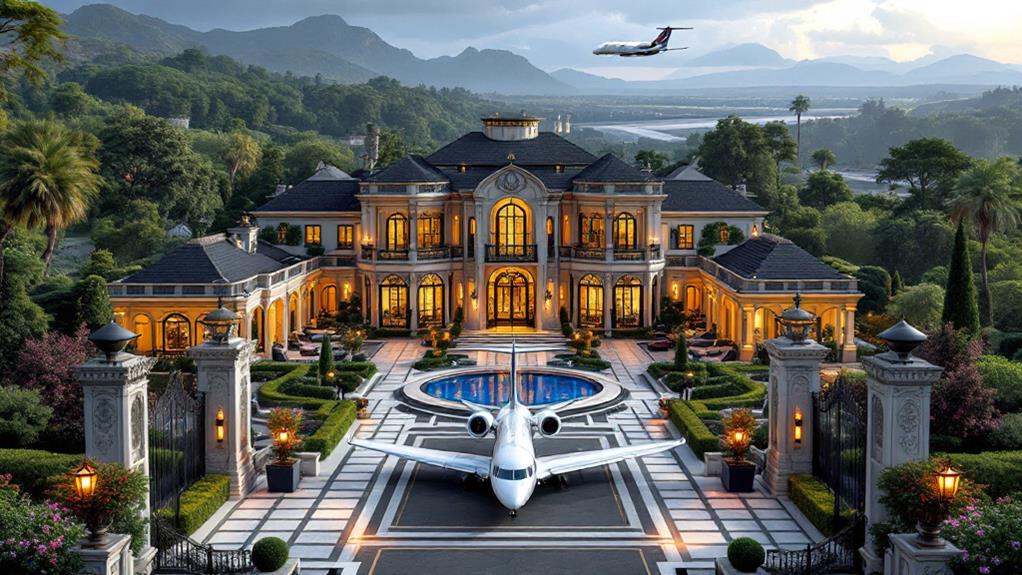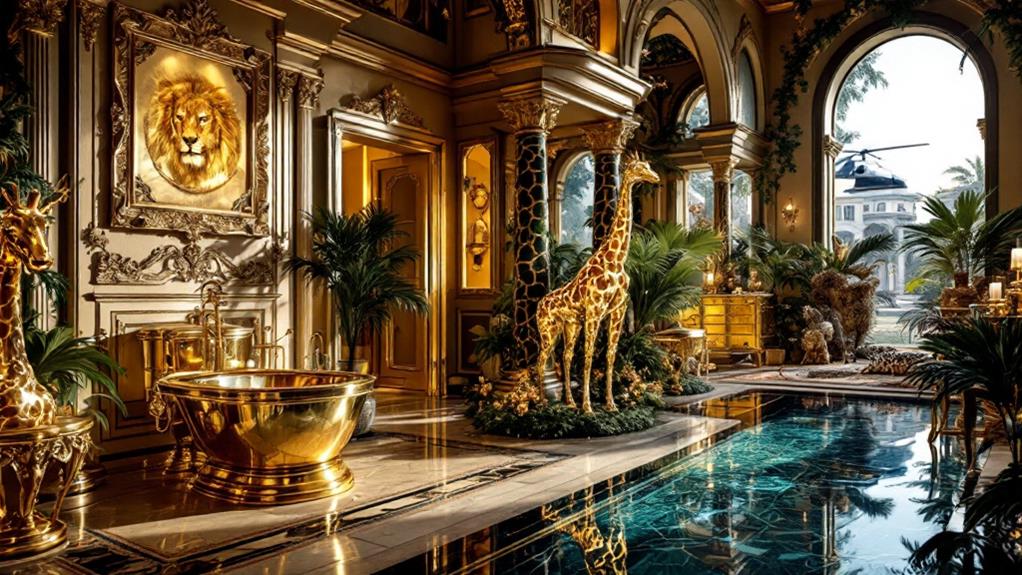Richest People in History: Who Were They and What Did They Own?
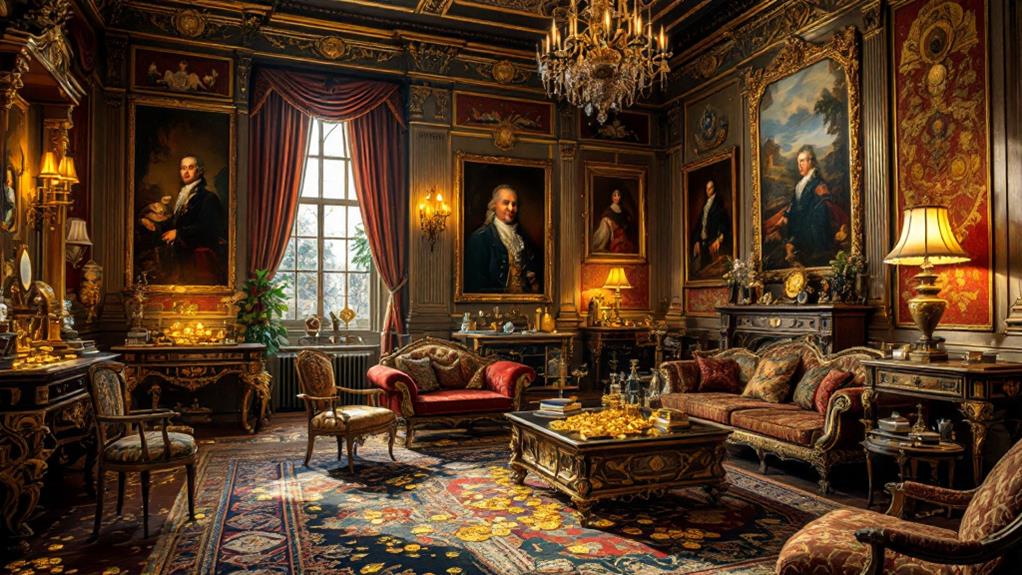
You're about to investigate the lives of history's wealthiest titans, whose fortunes rival today's largest economies. Mansa Musa's legendary wealth from Mali's gold mines tops the list, followed closely by Augustus Caesar who controlled 20% of the Roman Empire's economy. Fast forward to the Industrial Age, and you'll find John D. Rockefeller dominating U.S. oil with a net worth adjusted to an astonishing $341 billion. Modern billionaires like Elon Musk and Jeff Bezos continue this legacy, shaping industries and shifting global power. Keep going to uncover more about how these individuals wielded their immense wealth and influence.
Ancient Wealth Titans
When you investigate the annals of history, a few figures stand out as the titans of ancient wealth. Mansa Musa of Mali is often regarded as the wealthiest person ever. His fortune stemmed from Mali's abundant gold resources. His legendary pilgrimage to Mecca in 1324 showcased his immense personal wealth, as he traveled with an entourage of 60,000 and carried 18 tons of gold. This expedition impacted economies far and wide.
Augustus Caesar, the primary Roman emperor, wielded extraordinary financial power. His personal wealth, estimated at $4.6 trillion in the present-day dollars, represented about 20% of the Roman Empire's economy. His fortune was unmatched in the empire's history, allowing him to solidify his rule and influence Rome's future.
Marcus Licinius Crassus, another Roman figure, amassed his fortune, estimated at 200 million sesterces, through shrewd investments during public crises. His wealth made him one of ancient Rome's wealthiest people.
While Genghis Khan, the founder of the Mongol Empire, didn't leave behind personal wealth, his conquests reshaped global trade and wealth distribution. These ancient wealth titans left enduring legacies, shaping economies and empires. Their stories continue to captivate historians and economists alike.
Medieval Millionaires
As history marched forward from ancient empires to the medieval age, another set of wealthy individuals emerged, their fortunes altering the economic landscape of their time. Mansa Musa of the Mali Empire stands as one of the richest people in history. His wealth, largely from gold trade and tribute, is estimated to exceed $400 billion today. On his famous 1324 pilgrimage to Mecca, Musa's extravagant distribution of gold caused inflation, especially in Cairo, showcasing how his wealth could sway entire economies.
William the Conqueror, with his claim to the English throne in 1066, also ranks among history's wealthiest. Through extensive landholdings and the establishment of a feudal system, he amassed a net worth estimated around $200 billion today. His influence reshaped medieval England's economy and cemented his legacy among the richest figures of his time.
While later periods introduced other wealthy individuals, like Jakob Fugger and Mir Osman Ali Khan, who drew their fortunes from precious metals and gems, the medieval age remains significant. It was a time when wealth, regardless of conquest or commerce, defined the world and left an indelible mark on history.
Renaissance Riches
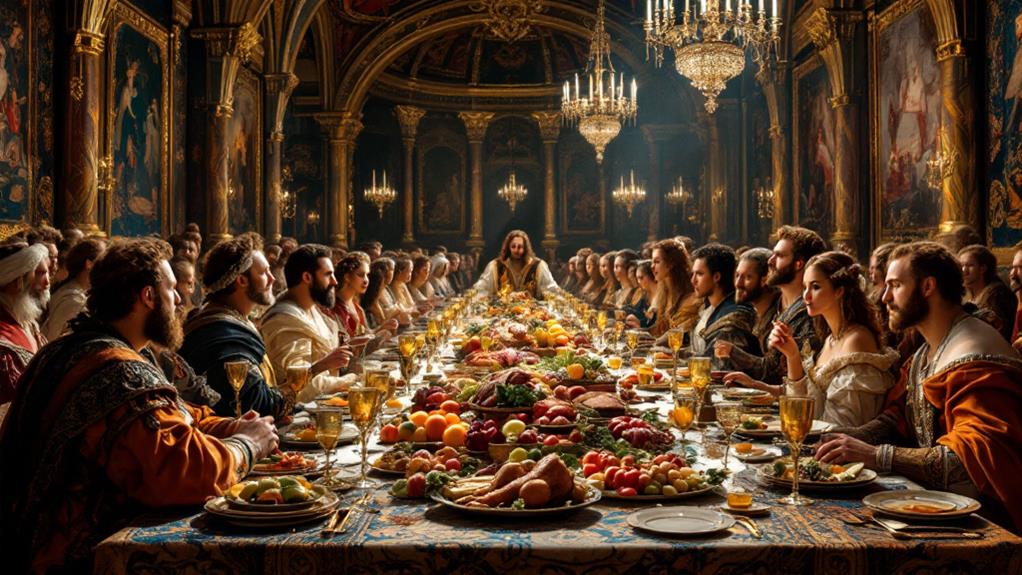
The Renaissance age was a transformative span marked by a surge in wealth accumulation among influential families, particularly in Italy. You'll find that families like the Medici in Florence dominated banking and played a crucial role in cultural developments. Their economic power extended beyond mere financial systems, as they were key patrons of the arts, commissioning masterpieces that still awe the world today. Their influence on Renaissance art and culture was profound, as they supported icons like Leonardo da Vinci and Michelangelo.
In this period, wealth often stemmed from trade, banking, and land ownership. Figures like Jakob Fugger rose to prominence through mining and banking, amassing fortunes that provided him with significant political influence in Europe. The merchant classes in cities such as Venice and Genoa gained substantial economic power, with families like the Dandolo and the Contarini thriving on trade routes and maritime dominance.
Innovations in banking, such as double-entry bookkeeping, emerged during this time, facilitating wealth management and commerce expansion. These advancements not only improved the financial prowess of Renaissance elites but also laid the groundwork for modern financial systems, cementing their legacy in history.
Industrial Era Tycoons
Imagine a time when industrial giants reshaped the world with their vast fortunes and groundbreaking advancements. You're transported back to the industrial age, where figures like John D. Rockefeller, Andrew Carnegie, Cornelius Vanderbilt, and Henry Ford emerged as iconic tycoons. John D., as the founder of the Standard Oil company, became the richest man of his time, controlling 90-95% of U.S. oil production with a staggering wealth of $341 billion when adjusted for inflation.
Andrew Carnegie built a steel empire, leading to a personal fortune of $250 million in 1901, after selling Carnegie Steel to J.P. Morgan. His impact on the steel industry was monumental. Meanwhile, Cornelius Vanderbilt left a lasting mark on American transportation through his ventures in shipping and railroads, amassing an inflation-adjusted net worth of $200 billion.
Henry Ford transformed the automotive industry by introducing assembly line production, making cars affordable for the masses. His creative strategies contributed remarkably to his personal fortune. These industrial age tycoons didn't just amass wealth; they transformed industries, influenced labor practices, and sparked philanthropy, leaving indelible legacies that continue to shape modern society.
Modern Billionaires

Today, you witness a different kind of wealth shaping the modern world through the influence and innovation of modern billionaires. These living individuals redefine what it means to be the richest, often holding fortunes that rival the gross domestic product of small nations. Elon Musk tops the list with a net worth of $180 billion, thanks largely to his stakes in Tesla and SpaceX. His vision for sustainable energy and space exploration showcases how tech-driven wealth can alter industries.
Jeff Bezos, with a fortune of $150 billion, transformed global commerce through Amazon, a company he's synonymous with. Bernard Arnault, another titan, controls a $211 billion empire through LVMH, underscoring the enduring allure of luxury goods. The difficulty of comparing wealth becomes evident as these fortunes are tied to volatile markets and personal ventures.
Bill Gates, worth $78.9 billion, remains a household name due to Microsoft and his philanthropic endeavors, impacting global health and education. Meanwhile, Mark Zuckerberg's $116 billion reflects the societal shifts driven by social media, as Meta Platforms, Inc. influences how billions connect. These modern billionaires not only amass wealth but also shape the future's economic landscape.
Wealth's Legacy and Impact
While modern billionaires continue to shape the world with their innovations and industries, the legacy of wealth stretches far back into history, illustrating its profound impact on societies. Mansa Musa, often considered the richest person ever, displayed his immense wealth during his 1324 pilgrimage to Mecca. His lavish spending and gold distribution greatly impacted economies, causing inflation along his route. This highlights how wealth's legacy extends beyond physical possessions, influencing entire regions.
John D. Rockefeller, a historical figure synonymous with American wealth, amassed a fortune estimated between $300 billion and $400 billion. His philanthropic efforts redefined charitable practices, leaving a lasting legacy on modern institutions. Likewise, Andrew Carnegie, with his $372 billion fortune, focused on philanthropy, funding libraries and educational initiatives that continue to shape American culture and education.
The influx of gold and silver during the Spanish conquests, like the massive ransom of Atahualpa, altered Europe's economic landscape, causing inflation and reshaping economies. Historical figures like Augustus Caesar and Genghis Khan further demonstrate wealth's power, with Augustus controlling a fifth of the Roman economy.
- Mansa Musa's wealth caused economic shifts.
- Rockefeller's philanthropy shaped modern charity.
- Carnegie's legacy transformed education.
- Gold influxes triggered European inflation.

